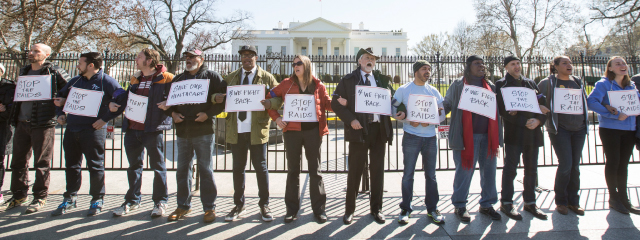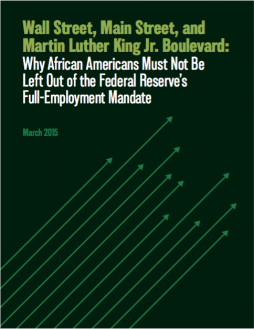Wall Street, Main Street, and Martin Luther King Boulevard: Why African Americans Must Not Be Left Out of the Federal Reserve’s Full Employment Mandate
Summary
Executive Summary
The story of the economic recovery varies dramatically depending on where it is being told. On Wall Street, big banks look stronger, bigger, and healthier than ever. Large companies are making record profits. But, the labor market remains weak. Although the economy has added more jobs in recent months, job growth on Main Street is not nearly as robust as during previous recoveries.[i] Unemployment rates in nearly every state remain above pre-recession levels. Wages have been stagnant or falling for most workers and the quality of jobs has decreased significantly. Main Street still has no clear route to prosperity.
Many communities are disproportionately struggling in this economy. The Latino unemployment rate is more than 2 percent higher than the rate for whites, and Latino wages and wealth are considerably lower than whites. Women continue to earn substantially less than men. This paper focuses on the economic disparities facing the African-American community in particular because the economic crisis is most acute there: African-American unemployment rates continue to exceed the national unemployment rates at the height of the recession, Black workers’ wages have dropped $0.44 over the past 15 years, though Latino and white wages have risen by $0.48 and $0.45, respectively; unemployment rates among African Americans are higher than those of other racial or ethnic groups; and, though Latino and white wealth has stabilized since the Great Recession, Black wealth continues to shrink. So, while Main Street may be stabilizing (albeit at a lower standard), the recovery has yet to reach Martin Luther King Boulevard. Creating a strong American economy must include prioritizing a genuine recovery for the African American community.
This joint report of the Center for Popular Democracy and the Economic Policy Institute examines the current state of the American economy and labor market, with particular attention to racial inequality and its contours before, during, and in aftermath of the Great Recession. It describes the role that federal monetary policy has played in exacerbating economic disparities over recent decades -- the shrinking national income share for working America and the exploding income and wealth gaps between the top 1 percent and the rest of us. The paper further explores the consequences of the major policy decision currently facing the Federal Reserve (or the Fed): whether to prioritize genuine full employment or to avoid inflation at the cost of robust employment and wage gains. Only by pursuing genuine full employment will the Fed ensure that the recovery reaches Main Street and Martin Luther King Boulevard – and communities of working people throughout the country. As the Fed makes crucial monetary policy decisions in the months and years to come, it must ensure that all communities can share in the prosperity of a functional economy.
The report also studies the decision-making processes and bodies of the Federal Reserve. Although the Board members that govern the regional Federal Reserve banks are legally required to represent the broad interests of the public, they are, in fact, predominantly representatives of the financial sector or large corporations. Without governance that represents the full diversity of the public, Fed decisions risk remaining uninformed by the full economic reality they create, as experienced in communities throughout the country. The Federal Reserve’s focus over the past 35 years has been on price stability, or tamping down inflation. While this focus is good for Wall Street, it has resulted in wage stagnation for most workers on Main Street. The cost of this focus has been slow recoveries in labor markets after each downturn. America needs the Federal Reserve to concentrate on labor market stability and insure that wages are rising with productivity, so that workers reap the benefits from their efficiencies and hard work; that means prioritizing a wage growth target, rather than inflation. A Federal Reserve dominated by banks and major corporations will produce an economy that works for them, at the risk of leaving tens of millions of working families – particularly Black working families – with little hope of a better life.
The report recommends that the Fed:
Create a Strong & Fair Economy
- Stimulate Good Jobs for All: The Federal Reserve should commit to building a full employment economy. It should keep interest rates low so that the numbers job openings and job seekers are balanced and everybody who wants to can find a good job.
- Invest in the Real Economy: The Fed should use its existing legal authority to provide low- and zero-interest loans so that cities and states can invest in public works projects like renewable energy generation, public transit, and affordable housing that will create good new jobs.
- Research for the Public Good: The Fed should study the harmful effects of inequality and examine how policies like raising the minimum wage and guaranteeing a fair workweek can strengthen the economy and expand the middle class.
Create a More Transparent & Democratic Federal Reserve
- Ensure That Working Families’ Voices Are Heard: Fed officials should regularly meet with working families and community leaders, not just business executives, in order to get a more accurate picture of how the economy is working.
- Represent the Public: In regional banks around the country, Fed leaders come overwhelmingly from financial institutions and major corporations. The Fed should appoint genuine representatives of the public interest to these governance positions.
- Create a Legitimate Process for Selecting Fed Presidents: In late 2015 and early 2016, the regional Fed banks will select their next presidents, who will serve five year terms. Currently, the process for selecting those presidents is completely opaque and involves no public input. That needs to change, so that the public has a real role in the selection process.
[i] Dean Baker, “257,000 Jobs Are Great, but Those Wall Street Boys Are Really Smart” (blog post), Center for Economic and Policy Research, February 6, 2015,http://www.cepr.net/index.php/blogs/beat-the-press/257000-jobs-are-great....













